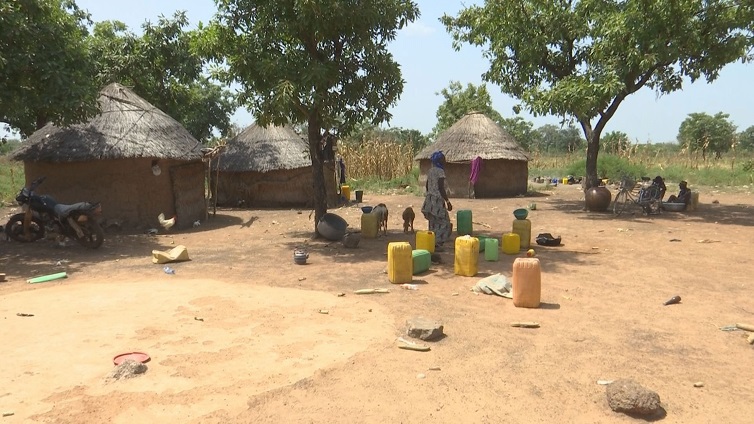
Credit: Ridwan Karim Dini-Osman/The World
Farmer Issah Paate sits on the ground in front of his thatched-roof house in Kpinchilla, a small village at the heart of the Savannah region in northern Ghana. The village is home to more than 2,000 people — mostly farmers — and Paate has been farming there for 30 years. This year, he said his harvest was less than half the usual amount.
“The weather is constantly changing. We can no longer predict the rains. We don’t even know when to plant our seedlings. Last year, two of my children had to drop out of school because I couldn’t get enough money from the harvest,” Paate said.
Climate change is altering rain patterns around the world, making drought and unusually heavy rains more frequent.
African climate negotiators at the COP26 United Nations climate talks this November, in Glasgow, are hoping to strike a deal that would increase climate finance to help Africans adapt and prepare for worsening climate change. It would also allow them to contribute toward the global goal to limit a temperature rise to 1.5 degrees Celsius.
Across Africa, increasing temperatures, rising sea levels, unpredictable rainfall and flooding are adversely affecting millions of people, according to the World Meteorological Organization.
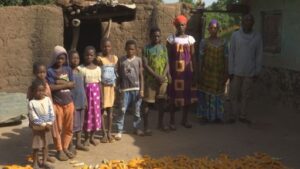
Credit:
Ridwan Karim Dini-Osman/The World
While Africa contributes negligibly to the changing climate, with just about 2% to 3% of global emissions, it stands out disproportionately as the most vulnerable continent in the world.
Paate has considered quitting farming despite having no alternative way to support his wife and eight children.
“For the most part of 2020, my family went hungry because the rains kept delaying. Currently, even where to find water for irrigation is another headache. All the dams have dried up because of the hot weather. My livestock are dying because [the] pasture is almost non-existent,” he said.
Vulnerable communities like the one in Kpinchilla need to adapt and prepare for worsening climate change, experts warn.
But the Ghanaian government says it doesn’t have the money to pay for new irrigation projects or drought-resistant seeds, especially with rising debt due to the COVID-19 pandemic.
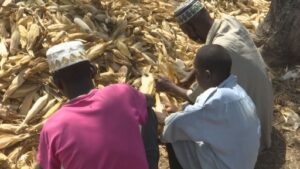
.
Credit:
Ridwan Karim Dini-Osman/The World
UN Secretary-General António Guterres has called on the international community to help. But the developed world is already falling short on promises to mobilize $100 billion a year to help developing nations adapt to, and limit, climate change.
At this year’s climate conference, the African negotiating team will be pushing for $20 to $30 billion earmarked specifically for African nations.
Seyni Nafo, the spokesperson for the African Group of Negotiators on Climate Change (AGN), believes that developed countries could easily help meet that demand.
“Money is not a problem. That’s just factual. What is at stake here is the political will to deal with the problem. And that’s why, as an African group, we have become extremely shrewd in building coalitions with the rest of our developing countries’ groups to really advocate for our demands.”
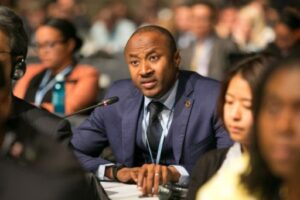
Credit:
Courtesy of the African Group of Negotiators
Nafo said some of the money they’re asking for would be used to bring relief to farmers bearing the brunt of climate change.
“Net shading, drip irrigation, digital climate advisory services, all of that is a whole universe of solutions which needs to be brought to our farmers to deal with climate change. And mobilizing climate finance, this is what we have realized as a group — it is a full-time job.”
African governments already spend between 2% and 9% of their gross domestic product on adaptation programs.
By 2050, the UN estimates annual adaptation costs in developing countries could increase seven-fold.
The Pan-African Climate Justice Alliance argues it is time leaders acted with the same urgency in addressing climate change as they did in dealing with the pandemic.
“If industrialized countries were able to, within a record time, mobilize trillions and trillions of dollars to address this COVID-19 crisis, it means that there is a lot of money in this world. It is only that there is no political will by those who have caused the climate problem,” said Mithika Mwenda, executive director of the alliance.
Experts are concerned that richer countries may use the pandemic as an excuse for not meeting or increasing funding for developing nations.
Theo Acheampong, an energy economist at Aberdeen University, said African negotiators should point out that COVID-19 has hit their economies even harder.
“African nations need to spin the narrative actually around COVID and say that the pandemic has actually made things quite difficult for a number of our economies. Most of the funding that pre-COVID would have come in, had been curtailed, and this has had a dire impact on many livelihoods, including financing for climate adaptation programs,” he said.
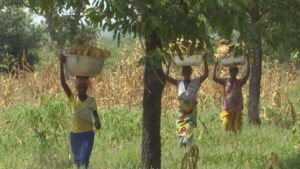
Credit:
Ridwan Karim Dini-Osman/The World
Young people will be most impacted by climate change and African youth delegations will be attending the conference to push for more inclusion in the UN process. Cordie Aziz, from Ghana, will be among them.
“It is very important that the African youth participate and really understand what’s happening, so we can better address issues that are happening in our own communities. I think this is going to be a very important conference for African youth to really pay attention to and take part in,” Aziz said.
Back in northern Ghana, farmers like Paate look forward to the days when the government helps pay for irrigation technologies, flood-defense structures and drought-resistant agriculture. He believes these could help turn things around for his farming.
“We seriously need this infrastructure here, especially for our vegetable farms. They will make life better.”
Until then, Paate has planted again and is hoping for more predictable rains and a better harvest this season.
Editor’s note: This story was produced in partnership with the Pulitzer Center on Crisis Reporting.












